‘The big elephant in Haiti’: As country sinks into anarchy, how much is U.S.’s fault?
- Oops!Something went wrong.Please try again later.
- Oops!Something went wrong.Please try again later.
When a sitting Haitian president was assassinated in 1915, U.S. President Woodrow Wilson sent in the Marines to protect American interests and secure stability. The military occupation, which lasted 19 years, marked the start of more than a century of close and controversial U.S. entanglement in the volatile internal affairs of Haiti.
Though the particulars of the always-fraught relationship between Haiti and the United States have since shifted time and again, one thing has not: Very little of real political import happens in Haiti without the involvement of the U.S. government.
U.S. policy in Haiti has been inconsistent at best, observers and insiders say, swinging from maintaining order at gunpoint to decades of propping up repressive, reviled leaders through political pressure and monetary and military aid. In more recent years, U.S. policy has focused on trying, and mostly failing, to secure a measure of democracy, political stability and economic development for the Caribbean country.
When things go wrong, as they often do in a poor nation long prone to political instability and shattered by a series of natural disasters in the past two decades, American administrations have shouldered the blame from Haitians and the outside world, accused at times of doing too much or, at others, not enough.
That persistent dynamic has come into stark relief once more as Haiti stands at a dangerous new boiling point following the 2021 assassination of unpopular, U.S.-backed President Jovenel Moïse. The installation by the U.S. and its allies of an acting prime minister widely seen by Haitians as both incompetent and corrupt sparked a shooting rebellion by an alliance of heavily armed criminal gangs that has left the country on the verge of political, economic and civil collapse.
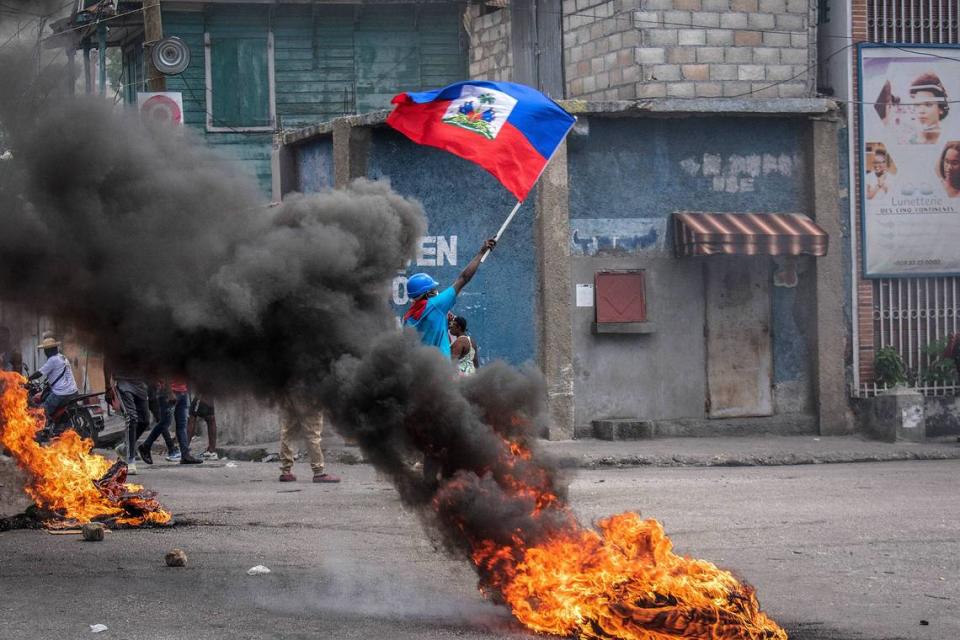
Once again, the specter of a U.S. military incursion hovers in the wings, even as the Biden administration and State Department officials maneuver furiously behind the scenes to stave off disaster while avoiding an overt intervention.
“Let’s put it bluntly: Haiti is a little country a few hundred miles from us,” said Robert Fatton, a Haiti-born professor of government and foreign affairs at the University of Virginia. “You cannot understand Haitian politics without looking at the presence of the U.S. Whether it is positive or malicious, that depends on the period. But it’s inevitable. Haitians in general don’t like that. But they are stuck with it. The U.S. is the big elephant in Haiti.”
One indicator of the outsize importance to the U.S. of Haiti, a country of barely 12 million people that has little geopolitical significance: The U.S. embassy in Port-au-Prince is by some measures one of the biggest American diplomatic installations in the world.
Fatton and critics from a wide range of viewpoints agree on one overriding perspective: Before and after the Moïse assassination, a series of U.S. blunders worsened Haitian political instability, further weakened already feeble government institutions and helped set the stage for the current anarchy by unwittingly empowering the gangs now holding much of the country and its cowed population hostage.
Few now see any good solutions in the offing or immediate cause for hope. But observers say the crisis in Haiti is one neither the American people nor their president can afford to ignore, given the risks of political chaos it poses in the United States’ backyard and the dire potential for a grave humanitarian crisis.
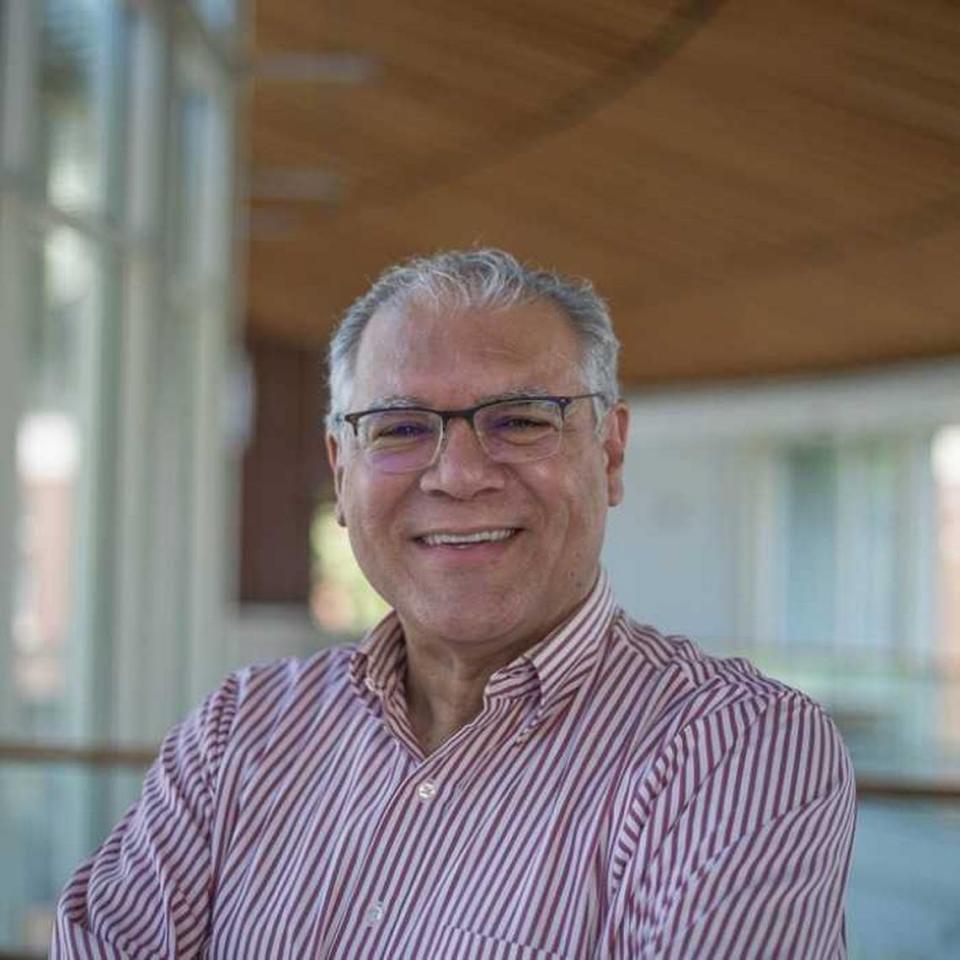
“It is deeply consequential to the U.S. and our security,” said James Foley, a retired American diplomat who was U.S. ambassador to Haiti from 2003-04. “We know what a failed state can potentially do. We have seen it in the Middle East. A failed state will bring to our shores many problems, including mass migration, maybe terrorism, narcotics and disease.
“Haiti has to be a permanent focus of U.S. policymakers. And Americans care. We have a heart as a people. Americans tend to be united when there is humanitarian suffering.”
Now the question Foley and other longtime Haiti observers and insiders are publicly debating is what the U.S. should or could be doing about it.
Few express faith in the arms-length process the State Department is widely believed to have imposed on Haitian political and civic figures and its Caribbean and international allies: establishing a seven-member presidential council to pick an interim head of government, set elections, and prepare the way for Kenya to dispatch a security force to help beleaguered Haitian police re-establish order.
Foley and others say that approach is unlikely to succeed, probably making a U.S. military intervention inevitable.
‘Painted into a corner’
“The international community has kicked the ball down the road,” said Luis Moreno, a retired U.S. diplomat who famously turned back armed rebels at the gate of Haiti’s presidential palace with a small security force in 2004. “People don’t want to get their hands dirty with Haiti. It’s almost inevitable that the U.S. will have to come in, and they will come in late. We have painted ourselves into a corner in Haiti.”
When precisely the painting started is a subject of some debate.
But experts coincide on several pivotal periods when U.S. administrations, both Democratic and Republican, made critical mistakes that contributed to gradually escalating domestic crises, beginning with Haiti’s first democratically elected president, Jean-Bertrand Aristide.
First elected in 1991, Aristide had been deposed in a military coup eight months later, near the end of President George H.W. Bush’s administration. He was restored to power in 1994 by the United Nations and President Bill Clinton, who sent Aristide back to finish his term accompanied by 20,000 U.S. troops. A U.S. military contingent stayed in Haiti until 2000 to back Haiti’s democratization.
Aristide was also the first Haitian president to peacefully cede power after his term ended in 1996 to an elected successor, René Préval.
Relations between Aristide and the U.S. began to sour, however, after his election to a second term in 2000.
Five years before, Aristide — with U.S. support — had dissolved the Haitian military that deposed him, a move, critics today say, that first opened the door to extensive political involvement by gangs of drug traffickers and street criminals.
While the military had an extensive history of repression, it also provided security across much of the country, especially in rural areas, which lacked police forces. The national police force created in its place has never had the resources or personnel to fully replace the military, said Jean-Max Bellerive, a former Haitian prime minister.
Into the vacuum stepped street and criminal gangs once held in check by the military, Bellerive said.
“When we lost the army, we lost also the control of our territory,” Bellerive said.
Aristide began relying on street gangs to back his political movement in the face of violent opposition.
“He fell into that trap,” Moreno said. “It’s the trap everyone in power in Haiti falls into. He went over the line. He saw it as his only chance of survival.”
Street confrontations culminated in a paramilitary rebel incursion into the principal cities of Cap-Haïtien and the capital of Port-au-Prince led by ex-cop — and later convicted drug trafficker — Guy Philippe. Aristide fled the country.
Philippe and his army reached the gates of the presidential palace, where he was turned back by Moreno and U.S. diplomats backed by a small security force. U.S. forces helped install a caretaker prime minister, but the White House was no longer willing to risk the perils to military personnel or the political fallout of having American troops long-term in Haiti again.
Instead, President George W. Bush supported an international United Nations military mission to tamp down unrest while new elections could be held.
Those elections came in 2006, and Préval again prevailed. Then came the devastating 2010 earthquake, which leveled stretches of Port-au-Prince and other population centers, killing more than 300,000 people, according to government accounts. Distrustful of Preval and the corrupt reputation of his administration, U.S. agencies and allies channeled aid through private foreign charities known as non-governmental organizations, or NGOs.
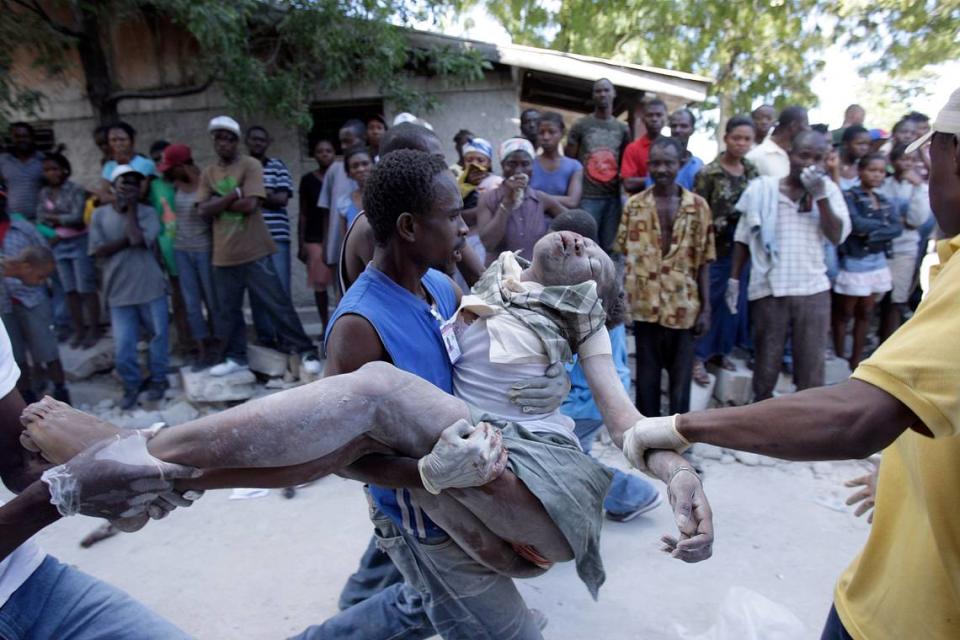
The result, critics say: the government and its already tottering institutions were further weakened. Unable to provide assistance to its own citizens, the Préval government became the target of popular fury. The NGOs effectively became individual fiefdoms that displaced government agencies.
In the end, Haiti had little to show. Much of the aid went to NGO costs and most of the promised billions of dollars in international assistance failed to materialize, Fatton said. Instead of taking on the harder task of building government capacity and leadership, the U.S. and its allies effectively opened the door wider to corruption and criminal influence, he said.
“After the earthquake, there was a real opportunity to change policy,” Fatton said. “But what we had was the typical idea that the government couldn’t do it, because the government was corrupt and lacked the bureaucratic capacity to be in the business of reconstructing Haiti.
Things really started to go wrong, observers and insiders say, when the Obama administration and Secretary of State Hillary Clinton once again intervened in Haitian politics, insisting that Préval hold elections in a barely functioning, devastated country.
After a disputed first-round election marred by allegations of fraud, Clinton pressured Haiti’s electoral council to put controversial third-place finisher Michel Martelly — a popular singer with a sketchy reputation and right-wing leanings who was seen as more pliable to U.S. interests — into the final round, which Martelly won.
Corruption and political violence flourished under Martelly. He embarked on a campaign of human-rights abuses against opposition figures, and cemented relations with drug traffickers and increasingly organized armed gangs that were importing large quantities of smuggled weaponry, primarily from the U.S..
But U.S. officials stood by Martelly even as he refused for three years to hold elections and extended his party’s control over Haitian affairs. Parliament was dissolved, the courts politicized and government officials replaced by loyalists, said Brian Concannon, executive director of the Institute for Justice and Democracy in Haiti, based in Massachusetts.
Ignoring the signs
“There was serious corruption under Preval, but it was worse under Martelly. He used the state as a cash cow for his political movement,” Concannon said. “The U.S. was involved in all levels in supporting Martelly’s government.”
Near the conclusion of his tumultuous five-year term Martelly and his party gave their support to Jovenel Moïse as his successor.
After a vote that was annulled due to pervasive fraud, Moïse prevailed in new elections that drew an abysmally low turnout amid a boycott by Haitian voters. The U.S. ignored the signs the election was badly flawed, critics say.
Widely seen as intransigent and intolerant of political opposition and dissent, Moïse was dogged by allegations of corruption, leading to mass protests demanding his resignation. But he clung to office with the support of the U.S. and its international allies.
Another major mistake by the U.S. and allies came in 2017, when the Trump administration supported the withdrawal of the U.N. security force, some experts say. The mission was controversial, blamed for starting a cholera epidemic and rights abuses of its own. Many Haitians had tired of the prolonged presence of U.N. troops — but the force had maintained a fragile stability across Haiti, said Foley, the former U.S. ambassador.
When the U.N. left, “a dynamic fell into place that would become more and more unmanageable,” Foley said. “The U.N.’s very presence was critical to have Haiti avoid descent into the anarchy we see today. That should have been clear to American policymakers. However great the reasons were, it was a terrible blunder.”
In July 2021, a gang of gunmen assassinated Moïse in his residence in the dead of night. The Biden administration backed Ariel Henry, a physician, as caretaker prime minister. Moïse had named Henry as PM just before his death, but a formal transfer of power had not occurred.
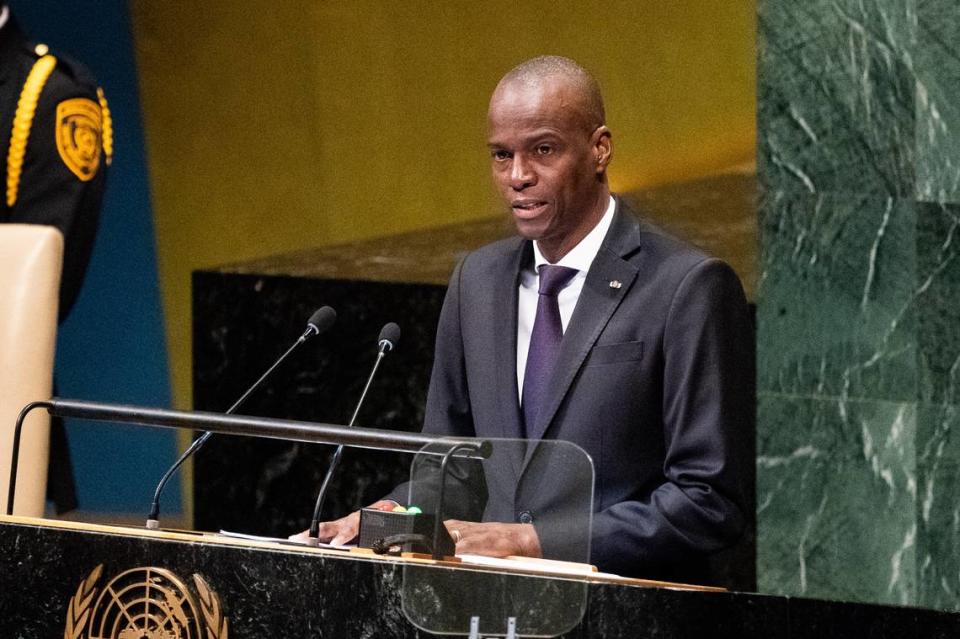
Inexplicably, Concannon and other critics say, the Biden administration stood by Henry well after it became clear the prime minister was utterly feckless and unable or unwilling to make any progress towards promised elections and a new constitution, while refusing to seriously negotiate with the political opposition.
Even as criminal gangs opposed to Henry’s rule created an unprecedented alliance and began attacking police stations, prisons and government offices and killing opponents and regular citizens, the U.S. ignored opposition pleas to do something about Henry, critics say.
“The U.S. wasted two and a half years and didn’t really pay attention to the opposition to Henry,” Fatton said. “They thought the situation could be contained, and obviously it wasn’t. The gangs were a problem then, but not the problem they are now.”
Compounding the issue: Last November U.S. authorities deported Guy Philippe, the would-be strongman, back to Haiti after he completed a federal prison sentence for drug trafficking. Philippe, who remains popular with some Haitians for his Robin Hood persona, promptly returned to his rebel role, creating yet another potent threat for the withering government.
The decision to return a convicted criminal like Philippe has baffled Haiti experts and observers, who say if he succeeds in forcing his way into power, he would likely turn the country into a full-fledged narco-state.
“I feel outrage, a sense of betrayal,” said Moreno, the retired diplomat who had kept Philippe from storming the presidential palace in 2004. “I don’t know how a guy like Philippe was allowed to go back to Haiti. I find it appalling.”
Foley called the decision “mind-boggling.”
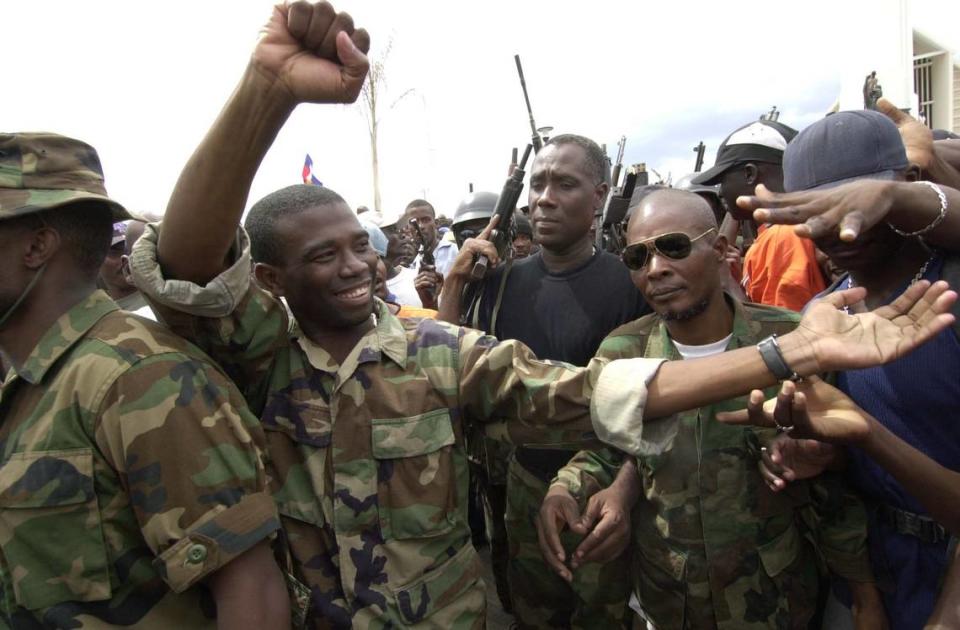
Still unwilling to commit the U.S. military as Haiti has descended into near anarchy, the Biden administration has instead backed a Kenyan mission to send 1,000 of its cops to help the Haiti police combat gangs.
The U.S. has since pulled its support of Henry, throwing its weight, along with that a group of Caribbean nations, behind the new presidential council. Henry, still technically in charge, remains stranded outside the country after a trip to Kenya, leaving Haiti effectively without a head of state.
In the meantime, Kenya has put a hold on sending the mission to Haiti even as gang attacks on civic, commercial and government installations continue.
That means the odds are stacked against the council succeeding, Fatton, Bellerive, Foley and others say, because nothing in the Haitian constitution allows the creation of such a council, and any resulting provisional government won’t win the support of ordinary Haitians or the gangs closing in on control.
‘Gangs have seat at the table’
The problem, Concannon contends, is that the gangs have amassed too much power and influence to be ignored or excluded.
“The people saying, ‘We can’t let gangs have a seat at table,” that’s silly. The gangs have already had several seats at the table. They have controlled territory for a long time,” Concannon said “ Every government has had to deal with that fact. Every political party has some kind of relationship with gangs.”
Fatton noted that the U.S. Marines have beefed up the security contingent at the U.S. Embassy, and speculated those troops could be called on if the gangs come too close to taking full control .
”Gangs have said if there is a new government, they will create hell in Haiti. And they won’t tolerate the new presidential council,” Fatton said. “At that point, my gut feeling is inevitably the protection will be provided by those troops.
“It’s not clear that the international community has learned the lessons of past failures. They keep spending money and doing the same thing all over again.”
Some critics say they problem has been insufficient or inconsistent levels of attention to Haiti by U.S. officials, especially recently as other crisis like the Russian invasion of Ukraine and the conflict in Gaza consume much of their attention.
As a consequence, Biden is now faced with a no-win quandary, they say.
“The pattern in American foreign policy for half a century is Haiti is regarded as a lower-tier issue,” said Foley, the former U.S. ambassador. “We are grappling with Russia at war in the middle of Europe and the Middle East on fire. It could not be a worse time to have to grapple with Haiti.
“The president will be damned if he does and damned if he doesn’t,” he added. “If he does send forces into it, Republicans will make hay of it, saying troops are being sent in support of a hopeless cause, a policy failure. On the other hand, if he doesn’t act and millions are starving and Haiti is in the hands of criminals and we are facing a criminal state just offshore, he will pay a tremendous political price for that.
“It’s a very unenviable position to be in for the White House.”

